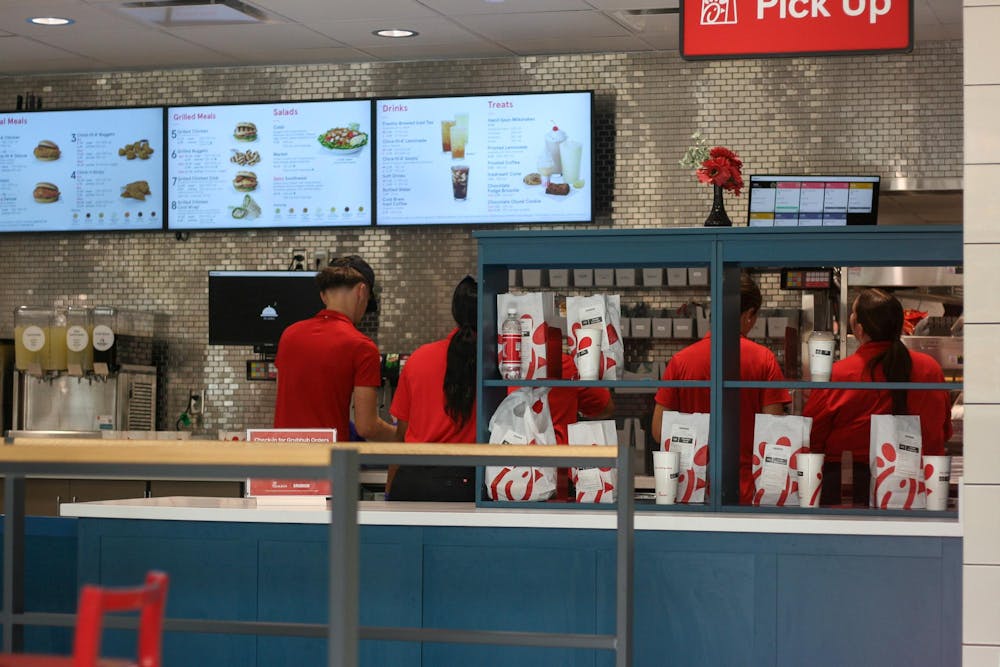When Miami University’s Chick-fil-A opened its doors on Oct. 27, Armstrong Student Center looked like students had never seen a fried chicken sandwich before. The wait for the new fast food chain on campus was nearly three hours; however, Miami’s Chick-fil-A is more than just an exciting new dining spot. It’s a commitment to sustainability.
From compostable nugget containers to recyclable cups, Miami’s Chick-fil-A location offers a range of sustainable packaging products. These products are a result of collaboration between Miami’s Office of Sustainability and Dining Services. Senior director of dining services Geno Svec said dining services works closely with Miami’s sustainability director, Olivia Herron, to implement earth conscious choices into the new location.
“We differ from other Chick-fil-As,” Svec said. “We moved from styrofoam to paper products that are environmentally friendly.”
This switch was made possible by the sustainable alternatives Chick-fil-A offers to their franchised establishments. Miami’s sustainability engagement coordinator Alex Miller discussed the difference between brand standard packaging products and products used at Miami’s Chick-fil-A.
“Their brand standard is the Styrofoam cups … , but we were able to request recyclable paper cups,” said Miller.
Miller said that certain brand standard Chick-fil-A products, including the cardboard fry containers, drink holders and napkins, were already environmentally friendly. However, this was not the case for other items.
According to Miller, Miami was able to get compostable wrappers as well as compostable nugget holders. In addition, all of the bags are paper and compostable. These are examples of products that are not Chick-fil-A brand standards, but can be purchased and used by individual locations.
“They have a lot of different opportunities where different Chick-fil-A establishments can shift to more sustainable purchasing options,” Miller said. “I believe that near everything could be recyclable or compostable if a certain location wanted to purchase that.”
Although this may have been an option, Miami did not switch every product to the recyclable or compostable alternative. Miller said that this was a strategic choice aimed at avoiding confusion among patrons.
Miller also said Miami’s decision not to purchase Chick-fil-A compostable straws is an example of this.
“If we had compostable straws that look like plastic, feel like plastic, but are able to be composted at Chick-fil-A [compared to] the red, actual plastic straws at Panera that look identical, then students will just have no idea what to do with them,” Miller said.
Lizzie Tabernik, a second year biomedical engineering student, agreed that with too much variance in Armstrong, students can easily get confused.
Enjoy what you're reading?
Signup for our newsletter
“It's harder when there's a mix of things,” Tabernik said. “Some recyclable stuff, some compost stuff – it's hard to separate them.”
Miller said accurate separation is vital for the success of composting and recycling at Miami.
“It sounds counterintuitive, but if you don't know where your waste goes, the landfill is always the best option,” Miller said, “because then you're not contaminating the recycling and compost that we have.”
In addition to preventing contamination, Miller said Miami considered the ease of procurement when deciding what to purchase for Chick-fil-A.
“We didn't want to, for example, buy all compostable cutlery, and then we're not able to actually get as much as we need,” Miller said. “Every now and then, we [would have] to buy plastic.”
The sustainable changes that Miami has made with Chick-fil-A have given students the opportunity to be more environmentally mindful.
“I think that there are definitely a good amount of people on this campus that really want to put in the effort to recycle everything they can and compost everything they can,” Tabernik said.
Miller said that the use of more sustainable products, like those in Chick-fil-A, could be implemented to other dining facilities in the future.
“These are just baby steps that we're starting with,” Miller said, “but still really exciting stuff moving forward.”




